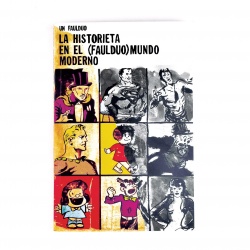Difference between revisions of "La historieta en el (Faulduo) mundo moderno"
| Line 12: | Line 12: | ||
|fabrication = Offset | |fabrication = Offset | ||
|isbn = 978-987-3789-10-6 | |isbn = 978-987-3789-10-6 | ||
| − | |ebook = [[Media:Un Faulduo La historieta en el Faulduo mundo moderno 2015.pdf|PDF]] | + | |ebook = [[Media:Un Faulduo La historieta en el Faulduo mundo moderno 2015.pdf|PDF]] (72 mb) |
}} | }} | ||
Hailing from Buenos Aires, Un Faulduo is an artists collective which has been investigating, through publications, scholar presentations and performative interventions the different articulations of comics and graphic literature. Here, they revisit Oscar Masotta's legendary research book ''La historieta en el mundo moderno'', originally published in 1970. Masotta's published research on North-American, European and Argentinian comics, as well as the First World Comics Biennial he directed in 1968, were seminal in the medium's history for treating comics as an art form in its own right. Un Faulduo using scans of a rare copy of Masotta's book, recompose the texts with collages, redraw illustrations and materially intervene on Masotta's text. This is a rare example of artistic research in comics, a praxeology proposing to further blur the boundaries between theory and practice. ''La historieta en el (Faulduo) mundo moderno'' could be understood as an exercise in perlaboration: a process in psychoanalysis that consists of recognizing and overcoming the resistances (here of the increasingly globalised dimensions of artistic resonance in comics practice) through the repetition, the elaboration and the amplification of an interpretation, that would have certainly appealed to Masotta's inclination for psychoanalysis. | Hailing from Buenos Aires, Un Faulduo is an artists collective which has been investigating, through publications, scholar presentations and performative interventions the different articulations of comics and graphic literature. Here, they revisit Oscar Masotta's legendary research book ''La historieta en el mundo moderno'', originally published in 1970. Masotta's published research on North-American, European and Argentinian comics, as well as the First World Comics Biennial he directed in 1968, were seminal in the medium's history for treating comics as an art form in its own right. Un Faulduo using scans of a rare copy of Masotta's book, recompose the texts with collages, redraw illustrations and materially intervene on Masotta's text. This is a rare example of artistic research in comics, a praxeology proposing to further blur the boundaries between theory and practice. ''La historieta en el (Faulduo) mundo moderno'' could be understood as an exercise in perlaboration: a process in psychoanalysis that consists of recognizing and overcoming the resistances (here of the increasingly globalised dimensions of artistic resonance in comics practice) through the repetition, the elaboration and the amplification of an interpretation, that would have certainly appealed to Masotta's inclination for psychoanalysis. | ||
Revision as of 09:27, 10 October 2020
 | |
| Author | Un Faulduo |
|---|---|
| Language | Spanish |
| Publisher | Tren en Movimiento (AR$ 490,00) |
| City | Buenos Aires |
| Date | 2015 |
| Pages | 160 |
| Format | 16 cm x 23 cm |
| Fabrication | Offset |
| ISBN | 978-987-3789-10-6 |
| E-book | PDF (72 mb) |
Hailing from Buenos Aires, Un Faulduo is an artists collective which has been investigating, through publications, scholar presentations and performative interventions the different articulations of comics and graphic literature. Here, they revisit Oscar Masotta's legendary research book La historieta en el mundo moderno, originally published in 1970. Masotta's published research on North-American, European and Argentinian comics, as well as the First World Comics Biennial he directed in 1968, were seminal in the medium's history for treating comics as an art form in its own right. Un Faulduo using scans of a rare copy of Masotta's book, recompose the texts with collages, redraw illustrations and materially intervene on Masotta's text. This is a rare example of artistic research in comics, a praxeology proposing to further blur the boundaries between theory and practice. La historieta en el (Faulduo) mundo moderno could be understood as an exercise in perlaboration: a process in psychoanalysis that consists of recognizing and overcoming the resistances (here of the increasingly globalised dimensions of artistic resonance in comics practice) through the repetition, the elaboration and the amplification of an interpretation, that would have certainly appealed to Masotta's inclination for psychoanalysis.
Reviews: Palabras amarillas (2015, ES), Mariano Kairuz (Página12, 2016, ES).